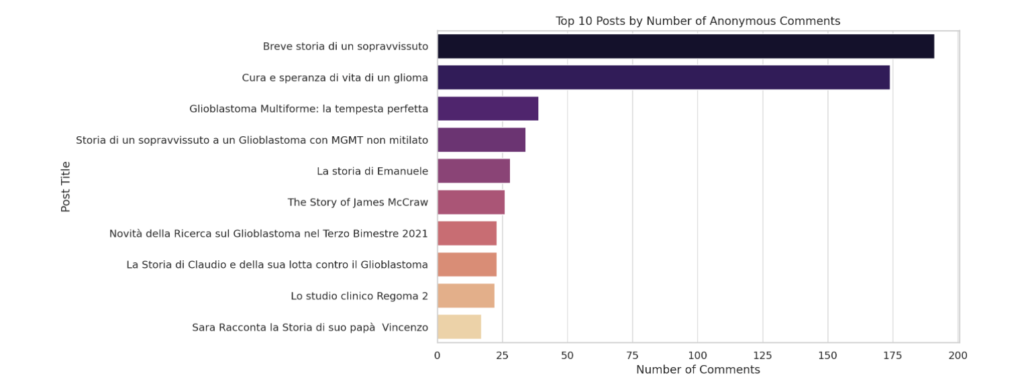Stories of Those Who Experience Glioblastoma: Shares from Patients and Caregivers on Glioblastoma.IT
Sometimes it is good to do an in-depth analysis of the service we are offering to patients and caregivers to understand if we are on the right path and understand how to improve. We have therefore analyzed the various comments on the articles on this site and what emerges is truly interesting. I’m sharing it with you and would love to hear your feedback on it. Meanwhile, there are thousands of comments and believe me it was not easy to do this in-depth analysis without the help of a bit of artificial intelligence. First of all, the most commented articles are the ones you see in the figure.

We asked ourselves what central themes emerge from the comments. This is a list of the main ones.
- Medical Discussions About Glioblastoma:
- Discussions often involve sharing personal experiences, treatment options, and outcomes, suggesting a community deeply engaged in supportive exchanges about health challenges.
- Expressions of gratitude and support:
- A recurring theme is the expression of gratitude, often directed at other members or at information shared within the community. This indicates a support network where members appreciate and recognize the help and guidance they receive, strengthening the sense of community and mutual assistance.
- Requesting and offering advice:
- Many comments involve users seeking advice on medical treatments or sharing their own recommendations and experiences. This indicates an active exchange of valuable information that could be crucial for decision-making in treatment or care strategies.
- Personal stories and emotional sharing:
- The comments are filled with personal stories detailing the struggles and journeys of people dealing with glioblastoma, either personally or through a loved one. This emotional sharing helps build connections between members, offering emotional comfort and a platform where experiences can be shared openly and empathetically.
- Technical and practical information:
- In addition to personal stories and emotional support, there is also significant sharing of technical and practical information related to glioblastoma treatments, research updates and clinical trials. This mix of emotional support and factual information helps members stay informed.
The website serves as a valuable resource for people affected by glioblastoma, providing a space for both emotional support and practical advice. The dual focus on emotional narratives and actionable information creates a balanced resource that supports both the emotional and informational needs of site users. This environment fosters a community where empathy and shared knowledge help create a support network, essential for addressing serious medical conditions.
We therefore also asked ourselves what the comments say are the most relevant topics to explore through new articles, projects and services. These are the most relevant topics that could further help patients and caregivers:
- Treatment experiences and options:
- Given the frequent discussions about treatments for glioblastoma, new articles may delve into the latest treatment options, including emerging therapies and clinical trials. These could provide updates, insights and detailed analysis on effectiveness, side effects and patient experiences.
- Personal stories and testimonials:
- Highlighting personal stories of struggle, success and resilience can have a profound impact. New articles featuring individual journeys can offer hope. They can also serve as a valuable source of information.
- Tips on managing symptoms and side effects:
- Practical advice on managing the symptoms and side effects of glioblastoma treatments could be extremely helpful. Articles might focus on pain management, nutritional advice, psychological health support, and ways to manage the physical and emotional aspects of the disease.
- Research and scientific updates:
- Regular updates on research findings, scientific advances and insights into the biological mechanisms of glioblastoma could help keep the community informed. This can include information about new studies, insights into why certain treatments work, and what research is showing promising results.
- Support resources and management mechanisms:
- Providing resources for emotional support, such as links to counseling services, support groups, and tools for managing psychological health, could be vital. Furthermore, posts on disease management mechanisms and Its consequences that helped others could offer practical and emotional support to sufferers and their families.
- Navigating healthcare systems:
- Guidance on navigating the complexities of healthcare systems, including tips on navigating insurance, accessing specialty care, and understanding patient rights, can be incredibly helpful for those who have just received a diagnosis or are struggling with recovery plans. management.
- Community interaction and involvement activities:
- Encouraging community interaction through question-and-answer sessions with medical professionals, live discussions, webinars and workshops can increase engagement and provide direct support to community members.
Each of these themes aligns with the core needs and interests expressed by community members through their comments. But ultimately this is what we have always done in recent years, we simply have to continue on this path drawing further ideas from this precious information. Thanks again to everyone who offered and will offer us their valuable feedback.